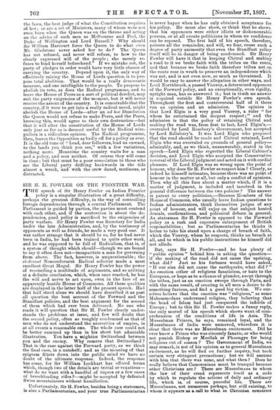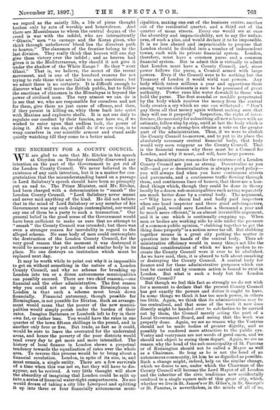SIR H. H. FOWLER ON THE FRONTIER WAR. T HE speech
of Sir Henry Fowler on Indian Frontier policy is a singular illustration of a great difficulty, perhaps the greatest difficulty, in the way of controlling foreign dependencies through a central Parliament. The Parliament is guided by parties, the parties must contend with each other, and if the contention is about the de- pendencies, good policy is sacrificed to the exigencies of party warfare. Sir Henry Fowler was Secretary for India under the late Administration, and, by the testimony of opponents as well as friends, he made a very good one. It was rather strange that it should be so, for he had never been in India, he had been trained to quite other work, and he was supposed to be full of Radicalism, that is, of a system of thought which should—though we are bound to say it often does not—incapacitate a man for governing from above. The fact, however, is unquestionable ; the ci-devant Nonconformist Radical solicitor made a most excellent Great Mogul. Sir Henry Fowler has the power of reconciling a multitude of arguments, and so arriving at a definite conclusion, which, when once reached, he has the will and nerve to act upon, even in the face of an apparently hostile House of Commons. All these qualities are displayed in the latter half of the present speech. Had that half stood alone we should have described it as past all question the best account of the Forward and the Standfast policies, and the best argument for the second of them which had ever been delivered. No one who reads it will question that Sir H. Fowler clearly under- stands the problems at issue, and few will doubt that the second policy, often so roughly condemned as that of men who do not understand the necessities of empire, is at all events a reasonable one. The whole case could not be better summed, up than in his short but admirable illustration. You have a mightier Switzerland, between you and the enemy. Why remove that Switzerland ? That is the case against the Forward party, as we think the final case, in a nutshell; and as the meaning of that epigram filters down into the public mind we have no doubt of the ultimate response. Indeed, the response has come, for Sir William Lockhart has offered terms which, though two of the details are trivial or vexatious— what do we want with a handful of rupees or a few cases of breechloading rifles ?—might be accepted by defeated Swiss mountaineers without humiliation.
Unfortunately, Sir H. Fowler, besides being a statesman, is also a Parliamentarian, and your true Parliamentarian is never happy when he has only obtained, acceptance for his policy. He must also show, or think that he shows, that his opponents were either idiots or dishonourable persons, or at all events politicians in whom no confidence can be reposed. The first half of his speech, therefore, poisons all the remainder, and will, we fear, rouse such a degree of party animosity that even the Standfast policy itself will be in danger of being condemned. Sir Henry Fowler will have it that in keeping Chitral and making a road to it we broke faith with the tribes on the route, and that because we broke faith therefore tribes not on the route rose in wrath to preserve an independence which was not, and is not even now, so much as threatened. It would be easy to answer the allegation in other ways, and Lord Northbrook, a passed Viceroy, a determined opponent of the Forward policy, and. an exceptionally, even rigidly, upright man, has so answered it ; but in truth no answer is required outside Sir Henry Fowler's own speech. Throughout the first and controversial hall of it there run an opinion and an admission. The opinion is that Lord Elgin is a very good Viceroy, a ruler "for whom he entertained the deepest respect;" and the admission is that the policy of retaining Chitral and making the road was, from first to last, Lord Elgin's,— overruled by Lord Rosebery's Government, but accepted. by Lord Salisbury's. It was Lord Elgin who proposed. that the road should be made and Chitral retained, Lord Elgin who was overruled on grounds of general policy— admirably, and, as we think, unanswerably, stated in the speech—Lord Elgin who regretted the Liberal Cabinet's decision, and Lord Elgin who accepted the Conservative reversal of the Liberal judgment and acted on it with cordial pleasure. If Lord Elgin was so wrong upon the point of honour, why does Sir H. Fowler so respect him ? Clearly, as indeed he himself intimates, because there was no point of honour in the matter at all, but only a conflict of opinions. Then why all this fuss about a matter which, if it is a matter of judgment, is included and involved. in the general difference between the two policies ? The answer is patent to every politician,—Because Members of the House of Commons, who usually leave Indian questions to Indian administrators, think themselves judges of any point of honour, and will enjoy on that subject heated denials, confirmations, and polemical debate in general. As statesman Sir H. Fowler is opposed to the Forward. policy as a rash and expensive enlargement of British responsibilities ; but as Parliamentarian he thinks it better to take his stand upon a charge of breach of faith, which the Viceroy, whom he respects, thinks no breach at all, and to which in his public instructions he himself did not allude.
But, says Sir H. Fowler—and he has plenty of "public opinion" behind him in asking the question— if the making of the road did not cause the uprising, what did ? Just so his forbears would have asked, "If our sins did not cause the earthquake, what did ? " An emotion either of religious fanaticism, or hate to the European, or hope as to a chance of plunder, swept through the tribes, just as an emotion sweeps through Paris, and with the same result, of creating in all men a desire to do something furious, and find a good big victim. We our- selves believe that the emotion was "religious," as some Mahommedans understand religion, they believing that the head. of Islam had just conquered the infidels of Europe ; but to this Sir H. Fowler makes a funny reply, the only morsel of his speech which shows want of com- prehension of the conditions of life in Asia. The Mussulman Princes, he says, remained loyal, and the Mussulmans of India were unmoved, wherefore it is clear that there was no Mussulman excitement. Did. he ever know a Prince who was sincerely fanatic, or who would not punish Bishop or Moollah or Phoongye for being religious out of season ? The Government of India, we may remark, is not of his opinion as to general Mussulman excitement, as he will find on further inquiry, but took certain very stringent precautions ; but we will assume with him that there was none, and what then? Does he really believe that Cameronians must be tranquil because other Christians are ? There are Mussulma,ns to whom the law of their creed represents itself as a code by which to regulate the actions of daily and ordinary life, which is, of course, peaceful life. There are Mussulmans, not numerous perhaps, but still existing, to whom it appears as a call to what in Christian countries we regard as the saintly life, a life of pious thought broken only by acts of worship and benevolence. And there are Mussulmans to whom the central dogma of the creed is war with the infidel, who are intermittently " Ghazis," men "to carnage and the Koran given, who think through unbelievers' blood lies the directest path to heaven." The clansmen of the frontier belong to the last division. They really think that heaven will one day give them victory over the infidel ; and as heaven had given it in the Mediterranean, why should it not give it under the shadow of the White Range ? So they "went Ghazi." That is, we believe, the secret of the recent movement, and is one of the hundred reasons for not trying to rule those who are liable to such emotions ; but we admit there is no certainty. It is difficult enough to discover what will move the British public, but to follow the emotions of clansmen in the Himalayas is beyond the power of civilised men. The very utmost we can do is to see that we, who are responsible for ourselves and not for them, give them no just cause of offence, and then, if they persist in killing us, whip them back into quiet with Maxims and explosive shells. It is not our duty to regulate our conduct by their fancies, nor have we, if we wished to enter upon that endless task, the power of doing it. All we can do, or shall do if we are wise, is to wrap ourselves in our scientific armour and stand aside quietly watching till they come to a better mind.







































 Previous page
Previous page